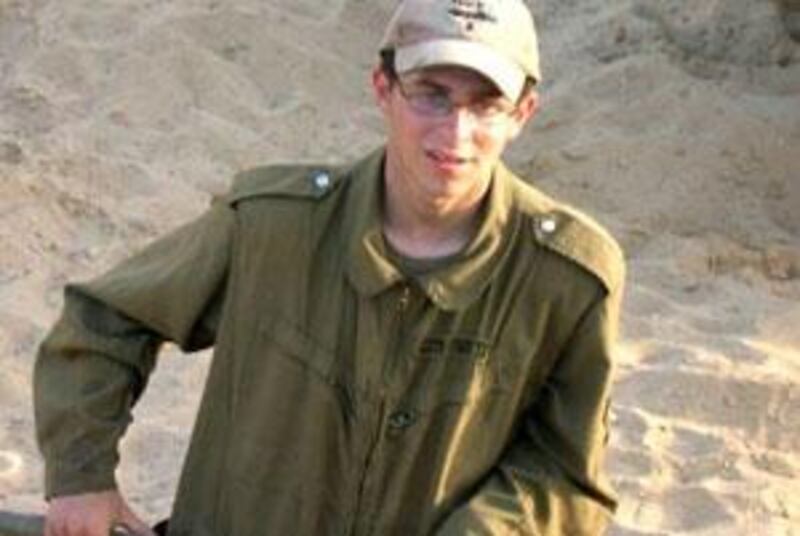RAMALLAH // Just two days before Israelis go to the polls to elect a new government, a ceasefire agreement between Israel and Hamas in Gaza is still very much in the balance, while the fate of Cpl Gilad Shalit, an Israeli soldier captured in 2006, looms large. Israel has tried to tie any deal on opening the Gaza crossings to a deal for the release of Cpl Shalit, who was captured in a cross-border raid in June 2006. Hamas has refused any such linkage, and Hamas officials say Cpl Shalit will only be released in the context of a prisoner exchange.
Nevertheless, Israeli press reports yesterday suggested a deal may be close. Turkey and Qatar, countries that have improving and close ties to Hamas, are reportedly mediating an agreement with the Hamas leadership in Damascus, even as Egypt is trying to broker a ceasefire with the Hamas leadership in Gaza. The two will not happen independently of each other. Israeli ministers have staked too much on their war in Gaza to enter into a ceasefire agreement that critics will point out could have been reached without the devastating offensive. The release of Cpl Shalit would provide a last-minute boost for the sitting coalition, which is facing an Israeli electorate that is increasingly tilting to the right.
Ehud Barak, the Israeli defence minister who is running for prime minister as head of the Labor Party, said on Friday that Israel's leadership was making "supreme" efforts to bring Cpl Shalit back home. "Supreme efforts are being made in order to hurry the moment when Gilad Shalit will come home," Mr Barak told Israel's Channel 1. "We know that he is well, alive, breathing and OK, but we need to bring him here from there."
With one eye on a future political comeback, there can be little doubt that Ehud Olmert, the Israeli prime minister who is not running for re-election, would also be very keen to tie up a deal to secure Cpl Shalit's release before he leaves office. However, Hamas officials have repeatedly rejected any suggestion that a deal for Cpl Shalit could happen in the absence of a prisoner exchange agreement, which, in turn, is unlikely without a ceasefire agreement.
Hamas has reportedly asked for the release of 1,400 Palestinian prisoners from Israeli jails, including all imprisoned Hamas parliamentarians, over 40 of whom were rounded up by Israel in the months after Hamas won parliamentary elections in 2006, as well as Marwan Barghouti, the prominent Fatah leader and a potential leadership rival to Mahmoud Abbas, the head of Fatah. Israel has baulked at those demands, but there is clearly room for compromise, though not as long as Gaza remains besieged.
"The issue of Shalit is a separate issue [from a ceasefire agreement]," Ayman Taha, a Hamas spokesman and a member of the Hamas delegation negotiating a ceasefire agreement in Egypt, said last week. "Once we have a ceasefire agreement that includes our main demands to end the siege on Gaza, then we can discuss other issues." Little has been leaked about the progress of ceasefire talks in Cairo. Yesterday, Mahmoud Zahar, one of the most senior Hamas leaders in Gaza, came out of hiding for the first time since the Israeli offensive and headed to Cairo, suggesting talks have reached a crucial stage.
Reports indicate that ceasefire talks are now focusing on the kind of goods Israel will allow into Gaza should crossings open. For Hamas to agree to any such limitations, it will in return ask for cast-iron guarantees that crossings will not be closed at a whim, guarantees that it will be down to Cairo to provide and which may only concern the Rafah crossing. And while Hamas officials publicly say they are not concerned about the outcome of Israeli elections on Tuesday, they privately acknowledge that any agreement will be harder to reach should Benjamin Netanyahu, the right-wing head of the Likud Party and the current front-runner, secure victory.
There is certainly a common interest for both the current Israeli government and Hamas to secure a deal on a ceasefire and a prisoner exchange before Tuesday. But as has happened before, notably when the last ceasefire lapsed, common interests do not always lead to predictable outcomes. okarmi@thenational.ae





